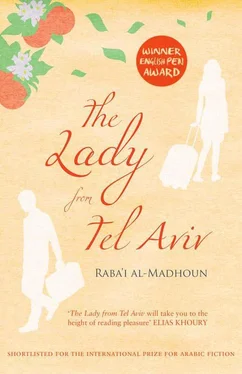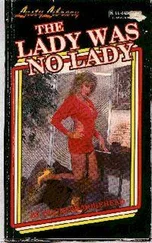By now, Adel is jumping up and down, shouting: ‘Leila’s alive, Walid! Where have you been all my life?’ Fortunately, there is no one else in the café besides us and the waiter, who is standing at the door, stifling the kind of laugh that would cost him a tip. Adel lifts me up and hugs me. In the commotion, he knocks over our cups and coffee and tea spill all over the tablecloth. The waiter rushes over, a black cloud hangs over him as he wipes up our mess.
Embarrassed, Adel says: ‘I’m really sorry! I just heard the best news in the world. Give us a new tablecloth — if you want, I’ll pay for this one. And the table too. I’ll buy the whole restaurant if you want — anything to take that frown off your face.’
‘Don’t worry about it, sir,’ the waiter says, by way of apology. ‘We’re here to serve our customers.’
Adel sticks his arm into his pocket and pulls out a hand whose fingers dance gingerly around a green fifty-dollar bill. He gives it to the waiter whose mouth hangs open so wide it looks like the nearby port of Gaza. ‘This is for you. Keep the change.’
The waiter thanks Adel and walks off with much more than a week’s pay in his pocket. At the waiter’s suggestion, we move to another table that is clean, and he goes off to bring us fresh cups of coffee and tea, free of charge.
Adel cools down and savours the excitement. I begin to tell him that I will arrange a meeting for him with Leila’s father, al-Hajj Darwish, if the man’s still alive. If not, I can arrange for him to meet with another man from the family whose opinion matters as far as Leila is concerned, especially with regard to the question of marriage. It is a sensitive issue, especially given Leila’s age. But Adel is adamant about marrying her — that is why he came to Gaza, after all. The only thing that remains in this long melodrama is the last episode — and Adel will have to finish his story himself. I tell him that I hope it ends like any old Egyptian movie, with Leila standing barefoot on a windswept sand dune. Closeup on her face for a moment, then she flies down the sand calling out Adel’s name. And there is Adel, dashing down the opposite dune, calling out her name. Close-up on the two lovers as they embrace. Fade out. The end.
Adel laughs. It seems as if a great burden has been lifted from him. He begins to run his fingers through his trim beard, and his eyes gleam like those of a groom on his wedding day. He turns to me and begins to recite the lines of poetry:
I love Leila passionately, the way the soul loves, and Love is a seducer!
O Exile of the heart, among the sons of the Dahman you will find her!
And together, like old friends, we laugh our heads off.
In the afternoon, my cousin Abul-Abd proposes that we pray together. He leans hard into his right hand and then, clutching his cane in his left, rises to his feet. As he goes over to the mats spread out on the floor, he asks, ‘Who’s going to lead the prayers? Everybody? Come on, Abu Meshaal, would you? Abu Meshaal, could you come forward?’
Abu Meshaal stands up and the others in turn rise to pray behind him.
The man leading the other cousins in prayer right now is my father’s cousin, whose full name is Samih Ismail Dahman. He is a midlevel Hamas organizer. Earlier, when he first walked into the room, people mentioned that he was preparing to nominate himself as one of the Hamas candidates for the Legislative Council elections. He earned his PhD. in economics from a university in the UK. Years ago, when he was in the final stages of writing his thesis, he sent me an email introducing himself. I was so happy to meet a cousin of mine, even though he had been born some time after I had gone away. It cheered me to know that there was another Dahman somewhere in Britain. His presence there somehow filled me with a feeling of real family. It was like having a glimpse of our country delivered to me. When he asked, I sent him a copy of my third novel. And despite being engrossed in his doctoral studies, he read it and let me know how much he admired it. When he asked me to send him a photo of my family, I did. When I asked him for a photo of his family, he did not hesitate. The person I saw in that picture was a young man in his early thirties. He had a long black beard and was going bald. There he stood, right between his young son and daughter. But that was all — the children’s mother, or as we like to refer to mothers, al-eila , was absent, or absented. I did not need someone to explain it to me.
Abu Meshaal had sacrificed his better half to the new culture that was just beginning to conquer our society back then. Later, that culture would impose itself even more fiercely on the men in our family. In time, it even caught up with me. Samih’s aunts, his father’s sisters — Souad, Samira and Ibtisam — were beautiful young women, as delicate and lovely as tamarind flowers. Those girls used to hug me to death whenever I went to visit them in Shati Camp. Those girls — Samih’s aunts — were my age, or thereabouts, and they went around with their hair uncovered, their arms and legs bare, sometimes wearing skirts that went above their knees. We were all of the same flesh, the same blood. I never felt anything in their hearts but their love and affection, and a fierce sense of pride about family. Back when I was a teenager, Abu Meshaal’s aunts were my sisters and I was their brother.
And here I am at fifty-seven years of age, a British citizen now, with lots of experience of the world, and Abu Meshaal is hiding his wife from me and making sure I do not get a peek at her. And now this cousin of mine is leading everyone in prayer.
I was surprised by what I saw when he first walked in today. He was completely clean-shaven — no beard, no moustache. When I teased him about it, I told the whole room that in the UK, he had lived as a whiskered man among the beardless. He had been the Other. The Arab. The Muslim. He was Difference itself. But back in Gaza, he had no facial hair at all. Here he was — the image of the modern Muslim.
He laughs now and half turns to ask, ‘Where are you, cousin? You back there behind me?’
‘Behind you in every way, cousin!’ I laugh back.
After receiving his first email, I decided not to coddle Abu Meshaal or delude him about myself. He and I began corresponding with one another. He would evangelize to me about the history of Islam, recounting its glorious past, and claiming, as so many others have, that when our society began to stray from religion, we fell into decay. He talked to me as if I knew nothing about Islam or history, as if he and his buddies were the first people to think up this revival stuff. As if it had never before been attempted. As if the Islamic state he talked about had not risen and fallen many times already, just like many other ancient and modern empires. I fought and pushed back until he was forced to travel further and further back into a history he drew with a pen from times gone by, and with tired ideas that had been attempted so many times before. I pushed back until at last he stopped writing altogether. And when he disappeared, I did not hesitate for a moment to delete his photo from my computer.
I am the only man who remained seated when the others went to pray. An untouchable, like a seed planted in the wrong ground, I felt a strange kind of discomfort. Despite this, I did not want to be untrue to myself. I rejected the idea of presenting a false image, and did not want them to invent some persona for me, the way Abu Meshaal had once done with his outlandish beard. A character created to conform to the demands of time and place.
I begin to study everyone, and my mind forms a panorama of the Gaza I am visiting. Fresh sea breezes wrapped in the stench of open sewers. The wide sea hidden from view behind settlements. Women veiled in black, proclaiming to the world that they are forever in mourning, both for those who have passed away and also for those who have not yet done so. Currencies wrapped in shekels. A religion wrapped up in the notions of countless sheikhs. And a sun that struggles to rise from behind all these wrappings and veils, searching for a face to shine its light on — a sun which, ashamed by what it sees, then decides to hide itself again, tired and worn out by the effort of looking.
Читать дальше












